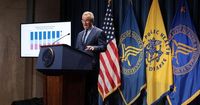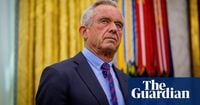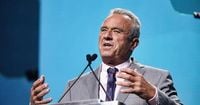The National Institutes of Health (NIH) is embarking on a controversial initiative to collect sensitive medical records from federal and commercial sources for a new autism research project led by Health and Human Services Secretary Robert F. Kennedy Jr. This initiative aims to provide external researchers with access to comprehensive patient data, representing broad coverage of the U.S. population, according to NIH Director Dr. Jay Bhattacharya.
In a presentation on April 21, 2025, Bhattacharya explained that the NIH is creating a national registry to track Americans with autism, which will be integrated into a sweeping federal data collection effort. The initiative is designed to connect various personal health information sources, including prescription histories from major pharmacies, genetic and lab data from the Department of Veterans Affairs and Indian Health Service, insurance billing records, and data collected from wearable devices like fitness trackers and smartwatches.
However, Kennedy's remarks about autism have drawn significant backlash from disability rights advocates and experts in the field. He has been criticized for promoting disinformation, claiming that autism is a "preventable disease" and an "epidemic"—assertions that lack scientific support. In a recent press conference, Kennedy declared that environmental toxins cause autism, disregarding extensive research that has found no such link.
Alycia Halladay, chief science officer at the Autism Science Foundation, stated that the increase in autism diagnoses is largely due to improved access to services and decreased stigma, rather than an actual rise in cases. "[The CDC] report is the most convincing evidence yet that changes in factors like access to services and de-stigmatization of autism spectrum disorder are leading to the increases in prevalence," she said. The CDC itself has confirmed that better screening and awareness are responsible for the rise in diagnoses, directly contradicting Kennedy's claims.
Experts emphasize that autism is not a singular diagnosis but encompasses a wide spectrum of experiences. Pediatric psychiatrist Zachary Warren noted, "Autism isn’t a single thing; it is a word we use in an attempt to capture a spectrum of behavioral strengths, differences, and vulnerabilities in order to help optimally support children." Lisa Settles, director of Tulane University’s Center for Autism and Related Disorders, added, "To me, it’s very obvious that [Kennedy] doesn’t know a lot about the diagnosis; he’s pulling things together into a theory that isn’t based in any ounce of science, and it’s really frustrating to those of us who are professionals."
During the press conference, Kennedy made alarming statements about autistic children, claiming they will "never pay taxes," "never hold a job," or "never go on a date." Advocates have countered that many autistic individuals do engage in these activities and can lead fulfilling lives with the right support. Kennedy has also suggested that families of autistic individuals are "injured" and should receive financial compensation, a stance that has outraged many families who feel his comments are ableist and harmful.
Disability organizations have united in their condemnation of Kennedy’s rhetoric, stating, "Claims that autism is ‘preventable’ are not supported by scientific consensus and perpetuate stigma." They argue that framing autism as a "chronic disease" or an "epidemic" distorts public understanding and undermines respect for autistic individuals. Kennedy has even compared autism to the COVID-19 pandemic, claiming that autism is more dangerous, which has drawn further criticism.
In response to Kennedy's comments, Sen. Maggie Hassan (D-New Hampshire) stated, "Secretary Kennedy is using a position of great power to continue to exploit the vulnerabilities of millions of Americans, all for the purpose of spreading his own unfounded and fully debunked beliefs." Advocates argue that rather than focusing on surveillance-style data collection or reviving long-debunked theories, the government should prioritize supporting the needs of autistic individuals through funding for home care, accessible education, and individualized services.
Despite the controversy surrounding Kennedy's statements and the initiative, the NIH's Bhattacharya assured that the research conducted will be of high quality, involving between 10 and 20 outside research teams that will be granted access to the data. However, these researchers will not have the ability to download the private medical data, as the NIH promises to implement state-of-the-art protections to maintain confidentiality.
While the initiative aims to provide a robust and secure computational data platform for chronic disease and autism research, it raises significant concerns about data privacy and the potential misuse of sensitive health information. Advocates worry that Kennedy's agenda could lead to further stigmatization of autistic individuals and misrepresentation of their experiences.
As the NIH moves forward with this ambitious project, the scientific community and disability advocates are calling for a more balanced approach that focuses on understanding autism through evidence-based research rather than sensational claims. The need for accurate information and support for autistic individuals remains a priority as the initiative unfolds.
In the coming months, the NIH plans to launch this data initiative, though specifics about the timeline and the duration of the studies have yet to be disclosed. Kennedy has indicated that some answers regarding the causes of autism may be available by September 2025, but he acknowledged that this will be an evolving process.
As the situation develops, many are left wondering how this initiative will impact the lives of autistic individuals and whether it will contribute to a greater understanding of autism or perpetuate harmful myths and stigma. The stakes are high, and the voices of those who live with autism must be at the forefront of this critical conversation.







